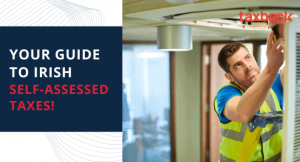Ireland Tax Calendar 2024: Key Dates and Deadlines
Get your key tax dates and deadlines for the 2024 Ireland tax calendar!
Check out the key dates or read an overview of PAYE taxes here.
Knowing all the key tax dates can make a big difference come tax time.
In Ireland, the tax year runs consecutively with the calendar year. This means it begins on 1 January and ends on 31 December.
Check out what that means for your taxes below!
01 January 2024
Income tax: First day of the new tax year.
Employment Detail Summary for 2024 is available.
Income Tax Return Form 12 is available for the taxpayer to complete and submit.
01 January 2024 Local Property Tax
Commencement of phased payments.
12 January 2024
Local Property Tax: Deadline for payment in full or confirmation of payment method to Revenue.
15 January 2024
Local Property Tax: Commencement of direct debit payments and continue on the 15th of each month.
А preliminary End of Year Statement is available for PAYE employees.
31 January 2024
Capital Gains Tax-Payment due on gains 1 December 2023 and 31 December 2023.
21 March 2024
Local Property Tax-Single Debit Authority deduction from a bank account.
31 March 2024
- Income Tax: Deadline for Return of Share Options and Other Rights for 2023
- Income Tax: Deadline for claiming Separate Assessment for 2024
- Deadline for nominating Assessable Spouse or Nominated Civil Partner for 2024
31 October 2024
Income Tax
- Preliminary Tax 2024
- Pay balance for 2023 liability
- Return of income for 2023
Capital Gains Tax
Return of capital gains for 2023.
01 November 2024
Local Property Tax: Valuation and property ownership date for 2025.
15 December 2024
Capital Gains Tax: Payment due on gains arising between 1 January 2024 and 30 November 2024.
31 December 2024
Income Tax: Last day of the tax year.
PAYE Taxes: Overview
.jpg)
Employees in Ireland are usually taxed in the Pay As You Earn Tax (PAYE) tax system. How much you pay usually depends on what you earn and is charged based on your gross income.
As part of PAYE modernisation, P45s and P60s have been abolished and replaced with an online system. Since 2019 you will no longer get a P45 when you leave a job. Instead, your employer will enter your leaving date and details of your final pay and deductions into Revenue’s online system.
PRSI (Pay Related Social Insurance)
Your employer will deduct PRSI which will be allocated to the social insurance fund. These payments may give you entitlements to benefits such as jobseekers benefit, illness benefit, state pension, etc.
Universal Social Charge
You’ll pay this if your income is more than €13,000.
In some cases, you may even have an overpayment of Universal Social Charge (USC), which Taxback can check for when you apply for your PAYE tax refund.
The average Irish tax refund is €1,880
How is your tax calculated?
Your employer applies PAYE and USC tax based on your employee tax credit certificate. If Revenue doesn’t have up-to-date information on your personal circumstances (marital status, dependents, etc.), you might get an incorrect allocation of tax bands and credits.
What happens if I underpay tax?
If it comes to Revenue’s attention that you have underpaid tax, they will reduce your take-home pay until the underpayment is settled.
If Revenue fails to notice the underpayments for years, you could be faced with a huge tax bill.
What happens if I overpay tax?
You can apply for an Irish tax refund! You may be due tax back if:
- You were made redundant
- You had a break in employment
- You paid emergency tax
- You went on maternity leave
- You got married recently
- Had medical/non-routine dental expenses
- And more
If you think you’re due a refund, you can get an estimate using our online tax calculator.
The average Irish tax refund is €1,880
Quick tax facts
- The tax year is January 1 to Dec 31
- You can go back 4 years for a tax refund
- The average Irish tax refund is €1,880
- You can get a refund estimate using our online tax calculator here.
Download your full guide to your mobile or PC below!




